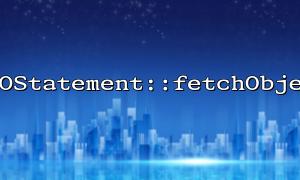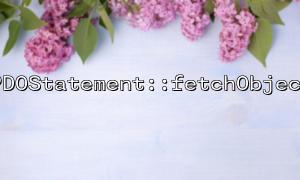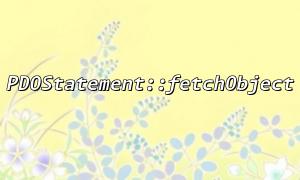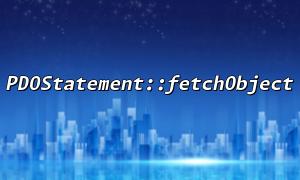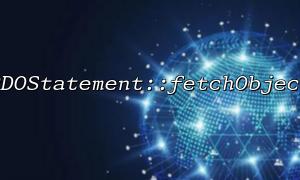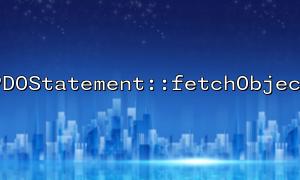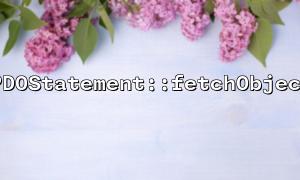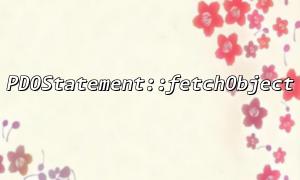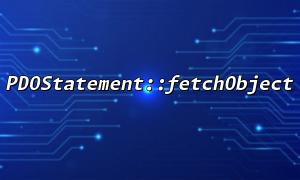When using PHP's PDO (PHP Data Objects) extension for database operations, PDOStatement::fetchObject and fetchAssoc are two commonly used methods to obtain data. They each have different characteristics and applicable scenarios. This article will explore their differences in depth and provide suggestions for choosing the right approach in different scenarios.
The PDOStatement::fetchObject method returns each row of the query result as an object. The attribute names of these objects are consistent with the column names of the database table. This method is suitable for scenarios where you want to access database results as objects, especially when you need to deal with complex logic related to objects.
<?php
// Example:use fetchObject
$stmt = $pdo->query("SELECT id, name FROM users");
while ($user = $stmt->fetchObject()) {
echo $user->id . ' - ' . $user->name . PHP_EOL;
}
?>
In this example, each row of the query results returns an object and the value of each column is accessed through the object properties.
The fetchAssoc method returns each row of the query result as an associative array. In this case, the key of the array is the column name and the value is the data of that column. Unlike fetchObject , the result returned by fetchAssoc is an array, not an object.
<?php
// Example:use fetchAssoc
$stmt = $pdo->query("SELECT id, name FROM users");
while ($row = $stmt->fetch(PDO::FETCH_ASSOC)) {
echo $row['id'] . ' - ' . $row['name'] . PHP_EOL;
}
?>
Here, each row of the query result will be returned as an associative array, with the key name being the column name in the database table.
fetchObject returns an object, and the data can be accessed through the object's properties.
fetchAssoc returns an associative array, and the data is accessed through the keys of the array.
fetchObject is suitable for object-oriented programming and is very useful when you want to manipulate objects in your code.
fetchAssoc is suitable for situations where data is easier to process in arrays.
When using fetchObject , you can directly access the object's properties, such as $user->id .
When using fetchAssoc , you need to access the data through the key name of the array, such as $row['id'] .
In most cases, fetchAssoc will perform slightly better than fetchObject because array creation and access are usually more efficient than objects. However, this performance difference is usually small and is only more obvious when processing large amounts of data.
If your project uses an object-oriented programming approach and you want to use objects instead of arrays when accessing database records in your code, then PDOStatement::fetchObject is a more natural choice. For example, if you use the ORM (Object Relational Mapping) library in your application, or if the data you want to return has some method or logic, then using fetchObject is more appropriate.
If you just need to make simple access and processing of query results, or you want to avoid creating object instances every time, fetchAssoc will be more efficient. Especially in scenarios with high performance requirements, fetchAssoc is a good choice because it returns an associative array and has faster access speeds.
If you need to deal with more complex data models, or you need to dynamically generate different objects based on different columns of a database table, fetchObject may provide more flexibility. For example, when building a common object mapping layer, fetchObject allows you to process data through simple object operations.
Some developers prefer to use objects in code rather than arrays, because objects are often able to provide better readability and maintenance. Especially when you need additional methods and logic to manipulate data, using objects will be more expressive. Therefore, in this case, fetchObject will be more in line with the developer's coding habits.
When choosing to use PDOStatement::fetchObject or fetchAssoc , you should decide according to your needs. If your application adopts an object-oriented approach and needs to operate database records as objects, then fetchObject is a more suitable choice. If you just need simple access and processing of data, and performance is a key consideration, fetchAssoc is more efficient.
In short, fetchObject and fetchAssoc each have their own advantages and disadvantages. The most important thing is to make appropriate choices based on the specific business scenario and code requirements.
References
Gitbox.net - PDO Operation
Related Tags:
PDOStatement
